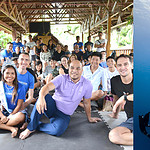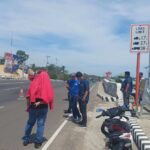“The role of women in peacebuilding is to educate herself, her family, and her community,” said Ustadja Anisa Taha-Arab, 58, vice president of the Noorus Salam National Women’s Council. Having defied the wishes of her father to marry her off when she was 14, and working her way through college education, the ustadja was speaking from her struggles.
“Hindi kami maalis-alis sa aming kultura na pinapairal ang kaisipan na ang babae ay hindi kailangang magsumikap sa buhay dahil bubuhayin rin naman siya ng kanyang asawa (We cannot seem to overcome our culture that promotes the mentality that women do not have to strive in life because, anyways, she will be taken care of by her husband), the Ustadja said, explaining the current situation of many Bangsamoro women.
Mananatili itong ganitong kalagayan lalo na kung walang maglakas loob na maninindigan, (This situation will continue to prevail, especially if nobody will dare stand against this norm.), Ustadja Anisa, as she is fondly called by those who know her, further said.
Ustadja Anisa grew up in a farming family in the small rural village of Margues in Datu Odin Sinsuat town, Maguindanao. She is the youngest of nine siblings. Coming from a poor segment of the population, schooling of the girls in her family was only supported up to Grade VI. “Just to enable them to learn how to read road signs and notices,” she said.
However, Ustadja Anisa proved to be of a different mold as she was growing up. When she was eight years old, she was enlisted at the local madrasah (Islamic school) to study Arabic at the same time that she was studying at the regular public school. In the madrasah she learned that Islam forbids forced marriage. “But my amah does not know that hadith (Islamic guidance based on the practice of Prophet Muhammad),” she said. Thus, her father arranged for her to marry her nephew when she was 14.
“I pleaded with amah (father) not to marry me off,” she recounted. However, her father insisted, saying she needed someone to protect her, as it was a time of war in Southwestern Mindanao.
“Lumayas ako, (I ran away from our house),” she said, to evade the planned marriage, and went to live with her cousin. To support herself, she farmed. Her parents tried to entice her to go back home, offering her money. She stood her ground. “I wanted to prove to my father that I was right.”
Eventually, Anisa’s father gave up and promised that he would no longer force her into marriage. Only then did she return home, continued her studies, and graduated as the valedictorian of her class in elementary. She also finished her elementary studies in the madrasa. It was 1975, the third year of the Martial Law regime in the country.
Amid the war, from 1975 to 1986, her schooling was stalled, but she pursued it relentlessly. She was accelerated to a higher level in high school, and again accelerated to college where she studied Bachelor of Arts in Islamic Studies, finishing her degree at 26. She became a teacher and handled Arabic class in the morning and organized communities for the Moro Islamic Liberation Front (MILF) in the afternoon.
“Ganyan dapat ang paninindigan ng mga babae (That is what the women should stand for)),” Ustadja Anisa concluded. She added: “Manindigan kayo. Huwag kayong mag-oo sa hindi tama (Women, stand up. Do not say yes to what is not right).”
In 1990, Ustadja Anisa got married to a man who courted her for three years. She said yes only after the man promised her father that he will love Anisa 120% more than her father ever did. To this day, her husband never took another wife.
The status of women in society was brought to fore as the Bangsamoro Autonomous Region in Muslim Mindanao joined the country in the celebration of the Women’s Month in March. The theme of the celebration was “WE for gender equity and inclusive society.”
Ustadja Anisa was among the discussants during the “Interactive Round Table Discussion on the Role of Women in Peacebuilding,” organized by Relief International and Balay Mindanaw Foundation which are partners in the Women Engaged in Responsive Solutions to Conflicts and Violence in Mindanao (WE RESOLVE) project funded by the German Foreign Federal Office in some areas in Lanao del Sur and Maguindanao. The activity, held during the opening of the Women’s Month last March 7 in Cotabato City, carried the slogan, “Nanay, ilaw tayo ng tahanan; Babae, gabay tayo sa kapayapaan (Mothers, we are the light of the home; Women, we guide the path to peace.)”.
Raised by Strong Women
Alliah K. Lucman, Gender and Development Focal Person, Provincial Government of Lanao del Sur echoed a similar perspective on the role of women in peacebuilding. She said: “Others may refer to ‘ilaw ng tahanan’ as a traditional mindset that binds women to the house. But that is the foundation of our society, the core of our values as a people.”

Lucman comes from a Muslim family where the men are allowed to have up to four wives. While her father provided sufficient economic support for the family, it was her mother who nurtured the children through adulthood. She said, “I have become who I am now because my mother stood strong for the family and guided us through when my father was not around.”
In the far-flung municipality of Hadji Muhtamat, formerly Pilas Island, in the province of Basilan, another strong woman leader attributed her achievements to her mother. Arsina Kahing-Nanoh, 28, was elected mayor of the island municipality in 2022. She defeated two male candidates for the post. Previously, she became the youngest vice mayor in the country at the age of 18.
“I was raised by a strong woman,” the mayor said.

“As a woman leader, I listen to my intention,” Kahing-Nanoh said, adding that she took pity at the plight of the residents of the island and decided to take the lead in changing the local situation. Among the projects she started on the island is the production of bottled milkfish and other preserved marine food products, which she hoped would bring additional income to the local fisher folk.
As a woman, she found herself amid a protective retinue of security details. She just amuses herself by saying, “That is how much they care for me.”
Women in charge
Another woman leader commanding a security force can be found in barangay Basak Malutlut in the City of Marawi. She is Norhaya Langco Indol-Grande, the punong barangay of the village. At the height of the Marawi Siege in 2017, she established a Barangay Police Action Team (BPAT) composed 20 men and 20 women.
The punong barangay said: “Mas madaling umaksyon ang mga babae sa pagsasa-ayos ng mga away. Napansin ko rin na nirerespeto ng mga sangkot sa away ang mga babeng BPAT (The women are quicker in resolving conflict. I also observed that those involved in physical fights respect the women BPAT).”

Indol-Grande thought about deploying the women as BPAT during the Marawi siege because they can have easier passage through security outposts, enabling them to facilitate the evacuation of residents. “The women BPAT also had less risk in encountering fights with the Maute rebels because Muslims are taught to respect women,” she said.
Basak Malutlut had been led by various women punong barangay for the past 36 years.
Asked how she addresses the notion that only men are allowed to take leadership positions in Islam, she said, “Si Allah (SWT) ang nagbibigay ng posisyon (It is God that gives the position.).” She added, “I have to accept that responsibility.”
Women and Peacebuilding
Speaking alongside Muslim women leaders during the roundtable discussion in Cotabato City, Charmaine Dagapioso-Baconga, 48, executive director of Balay Mindanaw Foundation, noted that there are still many barriers, including cultural norms, that hinder women from participating in peacebuilding efforts.
She said: “The challenge of peacebuilding is dealing with community structures where the assertion of women to participate in community leadership and decision-making is not encouraged, if not hindered by cultural norms. Many communities still hold to the notion that women do the household chores while men govern.”
Dagapioso-Baconga had been doing community development work in Mindanao for over two decades now.
Speaking in the same forum, Norma V. Constantino, program manager of Relief International in the Philippines, on the other hand, said that many community conflicts that are difficult to resolve involve women issues. “It is important for women’s voices to be heard, ensuring that women participate and lead in creating and enabling spaces for peace,” she said.
Constantino, who had personal experience in facilitating the resolution of rido (clan war), asserted, “If women are not involved, we are missing half of the population to make a difference.” (Jules L. Benitez/MindaNews)



